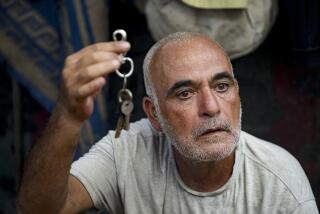Abandoned Boys Go Begging for a Childhood
- Share via
DAKAR, Senegal — Sitting on an empty can on the sidewalk, arms folded around his head to cover him from the blistering sun, a young boy named Abou is trying to catch up on sleep.
His day started well before dawn with a 90-minute hike to the center of Dakar, Senegal’s capital. The frail and malnourished child, dressed in dirt-blackened rags, has walked all morning barefoot on baking roads, begging for food and a few coins to take back to his teacher and guardian.
“This is my life. I have no choice,” Abou says. Then, to a concert of honking horns, he rushes across the road to pick up a coin thrown from a car window.
Like the other children with whom he begs, Abou was placed in the care of spiritual guides, or marabouts, to be taught Islam and its holy book, the Koran.
Abou has a mother and father, but was turned over to the Koran school too young to remember them. He doesn’t know his age, but looks 9 at most.
Tens of thousands of boys, some as young as 5, are known as talibe, “disciple” in Arabic. They come mostly from families struggling to feed too many children in Senegal’s arid countryside.
Koranic schools are a tradition in Muslim West Africa, appearing in the 11th century in Senegal’s northern Fouta region. Until Senegal’s independence from France in 1960, the schools were held in esteem. Many leaders graduated from the schools.
About 95% of Senegal’s 10.5 million people are Muslim, living under a constitution that defines the nation as a secular state.
Today, urban sprawl, population growth and rural poverty mean Senegal has more of the schools than ever, but comparatively fewer giving boys a future in exchange for their childhood.
Increasingly, marabouts are using the children as their work force -- laboring for the teachers at the unskilled job of begging, in the name of learning humility.
“How can I possibly take care of all of them?” asks Pape Seck, 25, a marabout at a Koran school on the outskirts of Dakar, kicking a boy of about 4 in the head when the exhausted child dozes off during morning Koran study.
“Their parents keep sending them to me even though they know I can’t afford to look after them,” he complains. A rubber whip is slung over his shoulder.
Every day, Abou and roughly 30 other boys in Seck’s care must beg at least 300 francs for the marabout. That’s roughly enough for two loaves of bread.
From dawn to dusk, the boys stand at streetlights, traffic jams, market stalls and restaurant entrances, imploring passers-by for coins or scraps of food.
“Tell her what happened to you,” Abou says, smiling and pointing at a slightly older companion named Alpha.
“One day, I was short of 100 francs -- and for that, I was beaten so hard with a rubber whip that I could not sit or sleep on my back for days,” Alpha says, lifting his shirt to show his scars.
The U.N. Children’s Fund estimates that there are 100,000 forced street beggars in Dakar alone. The great majority of them are at Koran schools.
Senegal’s talibe system is complex, deeply entrenched -- and in need of urgent reform, says Roberto Benes, a UNICEF child protection officer in Dakar.
“The situation is totally unacceptable,” Benes says. “At this very moment, a child is out there begging; another is probably being beaten or in deep suffering.”
Senegal’s government has made begging a punishable offense. But spiritual leaders are respected and influential, and no government leader wants to challenge Islamic institutions, so the child beggars multiply.
Some humanitarian groups, spearheaded by Dakar-based Enda Tiers Monde, support the more reputable Koranic schools by offering vocational training, healthcare and a more practical curriculum. One of the better regarded is the Saara Ndiougari School in Senegal’s Kaolack region. It’s among the few that give talibes a standard education as well as religious instruction.
But the vast majority of talibes -- like Abou and Alpha -- have never been taught to read or write, and likely never will be.
At their school -- in a shack built of plastic bags and wooden sticks -- the talibes recite Koranic verses by heart. Lunch is leftovers in their begging cans.
At night, the boys pile up in two cockroach-infested rooms with no lights and no beds -- just flattened cardboard boxes on the floor. Fun and laughter come from playing soccer with an empty can by the road.
When childhood ends around their mid-teens, the boys enter the adult world with no trade, no education and no connections.
Their choices then: unemployment, or becoming the next generation of marabouts and their aides.
Abou, however, has a better future in mind. One day, he hopes to return home. “Then I can become one of the big men driving a four-wheel-drive. And this time ‘round, I’ll be the one throwing coins.”
More to Read
Sign up for Essential California
The most important California stories and recommendations in your inbox every morning.
You may occasionally receive promotional content from the Los Angeles Times.













